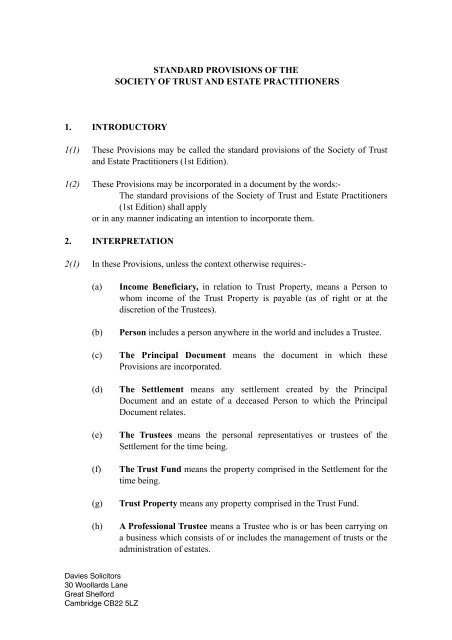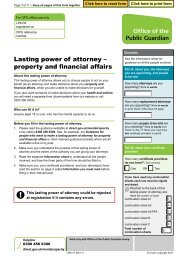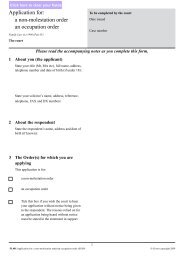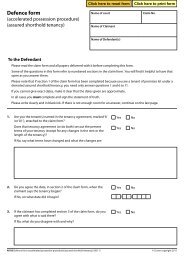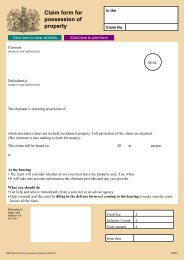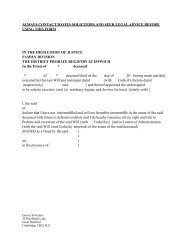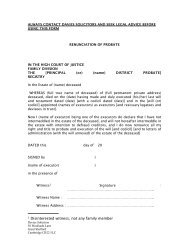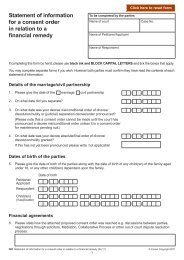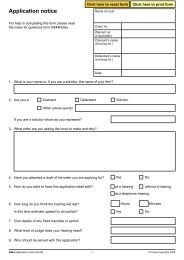STEP - Standard Provisions (1st Ed)
STEP - Standard Provisions (1st Ed)
STEP - Standard Provisions (1st Ed)
Create successful ePaper yourself
Turn your PDF publications into a flip-book with our unique Google optimized e-Paper software.
STANDARD PROVISIONS OF THESOCIETY OF TRUST AND ESTATE PRACTITIONERS1. INTRODUCTORY1(1) These <strong>Provisions</strong> may be called the standard provisions of the Society of Trustand Estate Practitioners (<strong>1st</strong> <strong>Ed</strong>ition).1(2) These <strong>Provisions</strong> may be incorporated in a document by the words:-The standard provisions of the Society of Trust and Estate Practitioners(<strong>1st</strong> <strong>Ed</strong>ition) shall applyor in any manner indicating an intention to incorporate them.2. INTERPRETATION2(1) In these <strong>Provisions</strong>, unless the context otherwise requires:-(a)(b)(c)(d)(e)(f)(g)(h)Income Beneficiary, in relation to Trust Property, means a Person towhom income of the Trust Property is payable (as of right or at thediscretion of the Trustees).Person includes a person anywhere in the world and includes a Trustee.The Principal Document means the document in which these<strong>Provisions</strong> are incorporated.The Settlement means any settlement created by the PrincipalDocument and an estate of a deceased Person to which the PrincipalDocument relates.The Trustees means the personal representatives or trustees of theSettlement for the time being.The Trust Fund means the property comprised in the Settlement for thetime being.Trust Property means any property comprised in the Trust Fund.A Professional Trustee means a Trustee who is or has been carrying ona business which consists of or includes the management of trusts or theadministration of estates.Davies Solicitors30 Woollards LaneGreat ShelfordCambridge CB22 5LZ
2(2) These <strong>Provisions</strong> have effect subject to the provisions of the PrincipalDocument.3. ADMINISTRATIVE POWERSThe Trustees shall have the following powers:3(1) Investment(a) The Trustees may invest Trust Property in any manner as if they werebeneficial owners. In particular the Trustees may invest in unsecuredloans.(b) The Trustees may decide not to diversify the Trust Fund.3(2) ManagementThe Trustees may effect any transaction relating to the managementadministration or disposition of Trust Property as if they were beneficial owners.In particular:(a) The Trustees may repair and maintain Trust Property.(b) The Trustees may develop or improve Trust Property.3(3) Joint propertyThe Trustees may acquire property jointly with any Person.3(4) Income and capitalThe Trustees may decide not to hold a balance between conflicting interests ofPersons interested in Trust Property. In particular:(a) The Trustees may acquire(i) wasting assets and(ii) assets which yield little or no incomefor investment or any other purpose.(b) The Trustees may decide not to procure distributions from a company inwhich they are interested.(c) The Trustees may pay taxes and other expenses out of income althoughthey would otherwise be paid out of capital.3(5) Accumulated incomeThe Trustees may apply accumulated income as if it were income arising in thecurrent year.3(6) Use of trust propertyThe Trustees may permit an Income Beneficiary to occupy or enjoy the use ofTrust Property on such terms as they think fit. The Trustees may acquire anyproperty for this purpose.Davies Solicitors30 Woollards LaneGreat ShelfordCambridge CB22 5LZ
3(15) Payment of taxThe Trustees may pay tax liabilities of the Settlement (and interest on such tax)even though such liabilities are not enforceable against the Trustees.3(16) IndemnitiesThe Trustees may indemnify any Person for any liability properly chargeableagainst Trust Property.3(17) SecurityThe Trustees may charge Trust Property as security for any liability properlyincurred by them as Trustees.3(18) Supervision of companyThe Trustees are under no duty to enquire into the conduct of a company inwhich they are interested, unless they have knowledge of circumstances whichcall for enquiry.3(19) AppropriationThe Trustees may appropriate Trust Property to any Person or class of Persons inor towards the satisfaction of their interest in the Trust Fund.3(20) Receipt by charitiesWhere Trust Property is to be paid or transferred to a charity, the receipt of thetreasurer or appropriate officer of the charity shall be a complete discharge to theTrustees.3(21) Release of powersThe Trustees may by deed release any of their powers wholly or in part so as tobind future trustees.3(22) Ancillary powersThe Trustees may do anything which is incidental or conducive to the exerciseof their functions.4. POWERS OF MAINTENANCE AND ADVANCEMENTSections 31 and 32 Trustee Act 1925 shall apply with the followingmodifications:(a) The Proviso to section 31(1) shall be deleted.(b) The words one half of in section 32(1)(a) shall be deleted.5. TRUST FOR SALEThe Trustees shall hold land in England and Wales on trust for sale.Davies Solicitors30 Woollards LaneGreat ShelfordCambridge CB22 5LZ
6. MINORS6(1) Where the Trustees may apply income for the benefit of a minor, they may do soby paying the income to the minor's parent or guardian on behalf of the minor, orto the minor if he has attained the age of 16. The Trustees are under no duty toenquire into the use of the income unless they have knowledge of circumstanceswhich call for enquiry.6(2) Where the Trustees may apply income for the benefit of a minor, they may do soby resolving that they hold that income on trust for the minor absolutely and:(a) The Trustees may apply that income for the benefit of the minor duringhis minority.(b) The Trustees shall transfer the residue of that income to the minor onattaining the age of 18.(c) For investment and other administrative purposes that income shall betreated as Trust Property.7. DISCLAIMERA Person may disclaim his interest under the Settlement wholly or in part.8. APPORTIONMENTIncome and expenditure shall be treated as arising when payable, and not fromday to day, so that no apportionment shall take place.9. CONFLICTS OF INTEREST9(1) In this paragraph:(a) A Fiduciary means a Person subject to fiduciary duties under theSettlement.(b)An Independent Trustee, in relation to a Person, means a Trustee whois not:(i) a brother, sister, ancestor, descendant or dependent of the Person;(ii) a spouse of the Person or of (i) above; or(iii) a company controlled by one or more of any of the above.9(2) A Fiduciary may:(a) enter into a transaction with the Trustees, or(b) be interested in an arrangement in which the Trustees are or might havebeen interested, or(c) act (or not act) in any other circumstanceseven though his fiduciary duty under the Settlement conflicts with other dutiesor with his personal interest;Davies Solicitors30 Woollards LaneGreat ShelfordCambridge CB22 5LZ
Provided that:─(i) The Fiduciary first discloses to the Trustees the nature and extent of anymaterial interest conflicting with his fiduciary duties, and(ii) there is an Independent Trustee in respect of whom there is no conflict ofinterest, and he considers that the transaction arrangement or action isnot contrary to the general interest of the Settlement.9(3) The powers of the Trustees may be used to benefit a Trustee (to the same extentas if he were not a Trustee) provided that there is an Independent Trustee inrespect of whom there is no conflict of interest.10. POWERS OF TRUSTEESThe powers of the Trustees may be exercised:(a)(b)at their absolute discretion; andfrom time to time as occasion requires.11. TRUSTEE REMUNERATION11(1) A Trustee who is a solicitor or an accountant or who is engaged in a businessmay charge for work done by him or his firm in connection with the Settlement,including work not requiring professional assistance. This has priority to anydisposition made in the Principal Document.11(2) The Trustees may make arrangements to remunerate themselves for work donefor a company connected with the Trust Fund.12. LIABILITY OF TRUSTEES12(1) A Trustee (other than a Professional Trustee) shall not be liable for a loss to theTrust Fund unless that loss was caused by his own fraud or negligence.12(2) A Trustee shall not be liable for acting in accordance with the advice of Counselof at least five years standing, with respect to the Settlement, unless, when hedoes so:─(a) he knows or has reasonable cause to suspect that the advice was given inignorance of material facts; or(b) proceedings are pending to obtain the decision of the court on the matter.13. APPOINTMENT AND RETIREMENT OF TRUSTEES13(1) A Person may be appointed trustee of the Settlement even though he has noconnection with the United Kingdom.Davies Solicitors30 Woollards LaneGreat ShelfordCambridge CB22 5LZ
13(2) A Professional Trustee who is an individual who has reached the age of 65 shallretire if:─(a) he is requested to do so by his co-trustees, or by a Person interested inTrust Property; and(b) he is effectually indemnified against liabilities properly incurred asTrustee.On that retirement a new Trustee shall be appointed if necessary to ensure thatthere will be two individuals or a Trust Corporation to act as Trustee.In this subparagraph Trust Corporation has the same meaning as in the TrusteeAct 1925.This subparagraph does not apply to a Professional Trustee who is:(a) a personal representative(b) the settlor of the Settlement or(c) a spouse or former spouse of the settlor or testator.14. P R O T E C T I O N F O R I N T E R E S T I N P O S S E S S I O N A N DACCUMULATION AND MAINTENANCE SETTLEMENTSThese <strong>Provisions</strong> shall not have effect:-(a) so as to prevent a Person from being entitled to an interest in possessionin Trust Property (within the meaning of the Inheritance Tax Act 1984);(b) so as to cause the Settlement to be an accumulation or discretionarysettlement (within the meaning of section 5 Taxation of ChargeableGains Act 1992);(c) so as to prevent the conditions of section 71(1) Inheritance Tax Act 1984from applying to Trust Property.Davies Solicitors30 Woollards LaneGreat ShelfordCambridge CB22 5LZ


